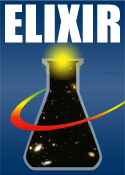





No vacancy: all ELIXIR positions described below have now been filled (by these early stage researchers)
These positions are based in Paris, Lyon, Madrid, Rome, Heidelberg, Leiden and Oxford, at institutions with expertise in the construction and analysis of deep galaxy surveys, detailed observational investigation of individual high-redshift galaxies and active galactic nuclei and related astronomical instrumentation, stellar population synthesis and the modelling of galactic spectra, and the modelling of galaxy formation in its full cosmological context.
The Early-Stage Researchers will work on a focused research topic, but they will also receive a broad training in cosmology and galaxy formation, both in the analysis of state-of-the-art observational data and in their theoretical interpretation, and in related astronomical instrumentation with special focus on the JWST/NIRSpec instrument of the European Space Agency. This will be accomplished through lecture courses at the local Universities and through three network-sponsored schools. Early-stage researchers will also have ample opportunity to interact with scientists from the entire Network during frequent exchanges and the regular Annual Meetings.
SALARY:
The EU funding for these positions provides a basic monthly take-home salary of around 1250 EUR (depending on the country), plus an extra monthly "mobility bonus" of 500 EUR (Single)/800 EUR (Married) to cover the expenses associated with working in a different country. In addition, early-stage researchers receive a yearly travel allowance to visit their home and a 2000 EUR career exploratory allowance, which is designed to help them find their next position. Generous funding is also available for travel to workshops, meetings and schools. The host institute will provide computer support and office space.
FILLED POSITIONS:
WHO CAN APPLY:
These positions will be open to highly qualified scientists in the first four years (full-time equivalent) of their research careers, starting at the date of obtaining the degree which would formally entitle them to embark on a doctorate, either in the country in which the degree was obtained or in the country in which the research training is provided, irrespective of whether or not a doctorate is envisaged.
Researchers are normally required to undertake trans-national mobility (i.e. move from one country to another) when taking up Marie-Curie network appointments. Two general rules apply to the appointment of researchers in a network:
HOW TO APPLY:
Early-stage researchers who are interested in one or more of the above positions are encouraged to contact the relevant Supervisors by email for more information. Candidates will be asked to supply the following material:
A copy of the application should be sent to the network coordinator, with an indication of the order of preference in the case of interest in more than one network site. Selection of candidates will take place before the Summer for positions starting this Autumn. Interested candidates should send their application materials as soon as possible. Applications from women and minorities are particularly welcome.
Address for hardcopy applications:
European Network Appointments Committee c/o S. Charlot Institut d'Astrophysique de Paris 98 bis boulevard Arago 75014 Paris, France